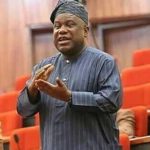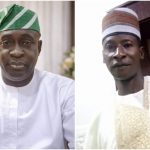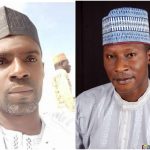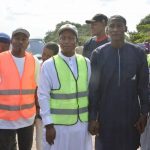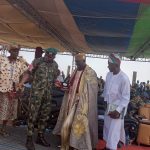We are committed to the cleaning of any oil spills into the environment in Nigeria – DG NOSDRA, Idris Musa
Mr Idris Olubola Musa is the Director General/Chief Executive of the National Oil Spill Detection and Response Agency (NOSDRA), born on September 17, 1957, in Yagba East Local Government Area of Kogi State of Nigeria. He holds a Bachelor of Science (B.Sc.) in Geography from the Prestigious University of Ibadan. He also holds two Master’s Degrees in Business Administration (MBA) as well as Urban and Regional Planning (M.URP) from the University of Ilorin and the University of Ibadan respectively, as well as several Professional Certifications and Memberships locally and internationally.
He has about 40 years of experience in different capacities in both the private and public sectors.
He started his career in 1980 as Executive Director (Operations and Accounts) in Oluyori Bottling Industry Nigeria Ltd., Isanlu in Kogi Stata where he later moved to Virgven Nigeria Ltd., Ilorin in Kwara State as Executive Director (Management Consultancy) in 1989. In 1996, he joined the public service as an Environmental Scientist in the defunct Federal Environmental Protection Agency (FEPA) and later to the Federal Ministry of Environment where he was deployed in 2004 as one of the pioneer staff to head the Oil Spill Detection and Response (OSDR) Department of the then newly established National Oil Spill Detection and Response Agency (NOSDRA).
He was promoted to the level of Director in 2008 NOSDRA and Director of Oil Field Assessment in 2011 following departmental restructuring in NOSDRA.
Mr. Musa retired from this position at NOSDRA in September 2017.
Being a vibrant and energetic personality, he was appointed as Head of Operations of the Hydrocarbon Pollution Remediation Project (HYPREP), Port Harcourt in the same year. He was appointed Director General/Chief Executive of the National Oil Spill Detection and Response Agency (NOSDRA) in March 2019 by the President of, the Federal Republic of Nigeria, President Muhammadu Buhari (GCFR).
Mr. Idris Musa has an uncommon wealth of experience in oil spill management.
He also served in several committees amongst which are the committees that worked on the preparation of documents leading to the establishment of NOSDRA and Clean Up Ogoni land.
He also worked on several projects and researches leading to several developmental achievements in Nigeria which are quite numerous to mention here.
He has also attended several international trainings, seminars and workshops.
He represents Nigeria on the Ten-Man Board of Pollution Crime Working Group of the International Police (INTERPOL) Idris Olubola Musa is happily married with children.
In this interview with the Publishers of DEMOCRACY NEWSLINE NEWSPAPER and THE EXPOSURE NEWSPAPER, Chief Olugbemi Femi and Mr Gabriel Olayemi respectively, in his office in Abuja, he stated that the agency under his leadership with the management staff have worked tirelessly to reposition its operations to carry out the statutory functions it was established for effectively and efficiently. He used the opportunity to commend the immediate past President, Muhammadu Buhari who find him worthy to be appointed in 2019 and reappointed in 2023 while acknowledged the fact that the renewed hope agenda of President Bola Tinubu to achieve cleaning environment in the oil region of Niger Delta is on course and other national sundry issues. Extract
What have been your activities since you were appointed in 2019 and reappointed in 2023 by former President Muhammadu Buhari?
Thank you, The agency was established primarily as a result of complaints about International Oil Pollution, Preparedness and Response Cooperation, the International Convention on Oil Pollution, Preparedness and Response Cooperation was held in 1990, (OPPRC 90) the international convention requires all countries signatory to the convention to have what is called National Oil Spill Contingency Plan and the contingency plan is a blueprint for preparedness, response to oil spill incidences, to ensure minimum risk, treat and damage to livelihood and environments, that is the essence of it and how its brought about.
It was a convention sponsored by the International Maritime Organization and the organization is in charge of the entire World Maritime Sector, over time, they saw very serious accidents of maritime tankers.
We have what is called Maritime Vessels (MV), Maritime Tankers (MT), Gucayoung, Erica and a few others, they had an accident on the high sea and the whole content they were carrying got destroyed, a maritime tanker carrying about 2 million barrel of crude oil and you know what it means to lose 2 million barrel of crude oil into the ocean.
So when they saw what happened they now said there was a need to have a contingency plan and what it meant was that there was no way if such an accident happened the crude would not get to the shoreline of some countries. So there is a need therefore to have a National Oil Spill Contingency plan.
All those who signed into it must necessarily have an institutional framework to implement it.
Nigeria signed into it in 1990 and could not implement it until 2003 when the Federal Executive Council under the administration of President Olusegun Obasanjo, approved the national oil spill contingency plans for Nigeria.
Then the draft was approved and later became a bill that was later passed by the National Assembly into an act of legislation.
The institutional framework is what is now called today National Oil Spill Detection and Response Agency implementing the National Oil Spill contingency plan, which was introduced in 2006. The bill went into the National Assembly in 2004 and stayed there for 2 years before it was passed to become law and assented to by President Obasanjo on 18th October 2006.
By the law, it is expected all oil companies operating in Nigeria either upstream, midstream or downstream must have an oil spill contingency plan of their companies so that if there is any oil spill in their area of operation, they can take care of it.
Then we now have response existence in three ties, one, two and three, similar to our system of government in Nigeria, federal, state and local government, there is a limit to what local government can do, whatever the local government cannot handle, it will escalate to state.
A situation where both local and state cannot do it will escalate to the national, and federal takes.
So whatever the oil company cannot do it will escalate to what is called Clean Nigeria Associate, (CNA) is a cooperative of some of them, there are fifteen (15) members now.
We want to make sure every oil industry operator; the upstream sector especially is part of that. So if you have a spill that is beyond your capacity, you will call in the (CNA), who will come, and clean it, at the end of the day they will send you the bill, and you settle them. If the spill goes beyond them both, then we will take it over at the National Oil Spill Detection and Response Agency.
We will now gather all the assets that are available both public and private to manage, we have done that about three times now in recent times.
By the law that established the agency, daily oil spill incidents must be reported, failure to report it will attract a sanction but if you report it, there is no sanction, and we will now follow up to do the necessary thing.
Initially, it was a bit difficult for them to comply but now virtually all of them have complied because the host communities are equally aware of it, they also paid attention to it.
There are two types of spills, one, spill incidents that will require compensation and two, spill incidents that will not require compensation, if, for example, they go to vandalize a pipeline by blowing it up, handsaw or tie a knot/verb on the pipe and the oil spills, the owner of the asset will come and repair it and clean up, no matter how many of your assets are damaged by this act, you will not receive any kobo because compensating them will be like encouraging them and paying for criminalities, so we don’t do that. But if it is corrosion or in the course of carrying out maintenance, you will have to compensate or pay anyone whose assets are affected, that is how it is.
How do we determine that, we have what is called a joint investigation visit, which comprises, ourselves, the oil companies, the host community, the state environmental protection agency, the Ministry of Environment and our sister agency, the former Department of Petroleum Resources now Nigeria Upstream Petroleum Regulatory Commission, reasons being that if you produce 10 barrel of oil for example, Nigeria expect the value of 10 barrels of oil from you but if there is a spill, out of 10 barrel, 3 barrel spilt, you know we cannot be asking for 10 barrels worth, that is why all NUPRC have to be there to see that it is only 3 barrels that spill for you to account for 7 barrels.
It is not our job to know how many barrels you will pay for but it is our responsibility to remove the ones that go into the environment, initially, NUPRC were doing the two before we were established, but when we were established they wanted to still lay claim to it, it was a big fight before they let it go.
When issues of spill happen, we always call them because they need to account for the oil that is produced while NOSDRA will take care of the ones that go into the environment.
There are other things we do, we check their facilities to make sure that the facilities are of high integrity, and that they are in good order.
We also need to know the location of their assets in case there is a spill and there is a need for clean up, depending on the location then we can mobilize those around the location for actions after which the cost of the work done will be paid for. We have costs that are redeemable and the ones that are not redeemable.
Sir, as one of the Stakeholders in Okunland, what would be your advice for the Okun youths?
My advice is that they should be steadfast and don’t go into criminalities, they should come up more, you know most of our people are not properly focused, being focused, you see, they need to go out and don’t limit their movement to their local government headquarters or to see Lokoja the state capital as their London or New York.
They should move from Lokoja to other cities, and move to urban centres like Lagos, Abuja, and Port Harcourt where there are many opportunities to explore. Our people tend to be a bit fearful instead of making more friends outside their areas; they think everything is all about money.
For me, ninety per cent of my friends are outside my community. You need to make friends from Sokoto, Maiduguri, Benin City, Delta, Ogun, etc, because different people have different ideas. You will need to expand, and from there you will see different cultures, and from there you will see which of these is compatible with your own because the people also have their peculiarities.
What some of them are doing in their area, if you tried it back home, you will get into trouble, then you will be guided on what to do and what not to do. From there you will pick the better ones, and from there, you will make your connection that will change your entire life positively but if you just go around your people the same thing, nothing has changed.
Even while choosing courses to study at the university, I can tell you, that I started in the environment, my first degree is in Geography, and I did a master’s in Urban and Regional Planning and, a master’s in Business Administration, I have my seal since 1999 as chartered Urban and Regional Planner. When I was in Owerri for two years, I used it to stamp land use maps for people because I was a zonal officer then, I did not have much work to do then but since I moved to the headquarters in 2001, no room for that again.
Since I got into the environment in 1996, I have moved away from Urban and Regional Planning as my main profession into environmental management.
In the space of 25 years now, I have been into so many areas of the Oil and Gas sector, so I don’t know anything anyone wants to talk about in the oil and gas sector that I will not know because I have undergone so much training in that regard. So if you are just within your locality you cannot get all of that, so those are types of things I will encourage them to do.
Something happened in Port Harcourt in 2017, six months before my retirement, I was posted to head the team for the Clean Up of Ogoni land, after six months I retired and I went to my Minister in Abuja to inform him that I had retired, he said Musa, you have to go back there. The ministry wrote a memo that Musa will continue to represent the agency on the project. I was there for another one and half years before I was appointed as Director General of the National Oil Spill Detection and Response Agency.
When I was going to some of the oil companies we were working with, Total Elf, Total Energy, Mobil, Shell etc, I told them I was coming to Port Harcourt, they all spoke well, luckily they were using our building in Port Harcourt, though we are on rent in Abuja here, some of them who thought they don’t need me again because I was retiring then, never knew I will back to the system, I told one them, whatever happens, I will be relevant in NOSDRA in the next thirty years based on my contributions and track records I have put into the agency.
There was a time we had to appear before the House Committee on Federal Character when the agency was accused of being one-sided in its appointment, I had to inform them that I was not the DG then but I promised to balance it when next the opportunity provided itself which happened last year that I got approval for 86 slots, and it was shared base on Federal Character.

